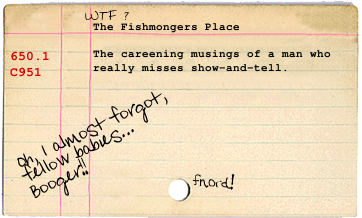I was looking over some German chemical analytical methods today, looking for a buffer preparation. Even though I don’t speak German, this is usually pretty simple, since most chemical names don’t change much in the transition from German to English. The prep I was reading said:
“20 mMol Ammoniumformiat-Puffer mit Ameisensaure aug pH 2.5 eingestellt.” [The second ‘a' in Ameisensaure should be umlauted. Not sure how to do that. Sorry!]
“20 mMol Ammoniumformiat-Puffer” is obviously 20 mMol Ammonium Formate Buffer, and the pH is adjusted to 2.5 with something. But what is “Ameisensaure”? From the context, I guessed that ‘saure’ was 'sour' indicating acid. But then what is ‘Ameisen’? Dropping Ameisen into the Word Monkey widget on my iGoogle page gives me ‘Ants’. So Ameisensaure is ‘Ant Acid’ (not to be confused with antacid).
 So, now I’ve got it! ‘Ant Acid’ must be Formic Acid, since Formic means Ant-derived. A google search and visit to german wikipedia confirmed this for me. Formic acid was initially discovered throught the distillation of ants. Presumably the ants were first killed, and vapors coming off of the little ant-y bodies (not to be confused with antibodies) were collected with a distillation column.
So, now I’ve got it! ‘Ant Acid’ must be Formic Acid, since Formic means Ant-derived. A google search and visit to german wikipedia confirmed this for me. Formic acid was initially discovered throught the distillation of ants. Presumably the ants were first killed, and vapors coming off of the little ant-y bodies (not to be confused with antibodies) were collected with a distillation column.
The etymology (not to be confused with entymology) of our English word ‘Ant’ is derived from the German word ‘Ameisen’ through the variant version 'Emmet' (not to be confused with Emmett, the famous hobo clown). Entymology means the study of insects, of course, so I was tempted to theorize that the “ent” might be related to ants yet again. It is, but only indirectly. It comes from the Greek ‘entemon’, meaning insect. I wa surprised to see that both words come from a similar root, meaning ‘cut’ - insects for the way their waist appears to ‘cut in’, and ants for the way they bite. And that wraps up the etymology of entymology, and this post!
 So, now I’ve got it! ‘Ant Acid’ must be Formic Acid, since Formic means Ant-derived. A google search and visit to german wikipedia confirmed this for me. Formic acid was initially discovered throught the distillation of ants. Presumably the ants were first killed, and vapors coming off of the little ant-y bodies (not to be confused with antibodies) were collected with a distillation column.
So, now I’ve got it! ‘Ant Acid’ must be Formic Acid, since Formic means Ant-derived. A google search and visit to german wikipedia confirmed this for me. Formic acid was initially discovered throught the distillation of ants. Presumably the ants were first killed, and vapors coming off of the little ant-y bodies (not to be confused with antibodies) were collected with a distillation column.The etymology (not to be confused with entymology) of our English word ‘Ant’ is derived from the German word ‘Ameisen’ through the variant version 'Emmet' (not to be confused with Emmett, the famous hobo clown). Entymology means the study of insects, of course, so I was tempted to theorize that the “ent” might be related to ants yet again. It is, but only indirectly. It comes from the Greek ‘entemon’, meaning insect. I wa surprised to see that both words come from a similar root, meaning ‘cut’ - insects for the way their waist appears to ‘cut in’, and ants for the way they bite. And that wraps up the etymology of entymology, and this post!


No comments:
Post a Comment